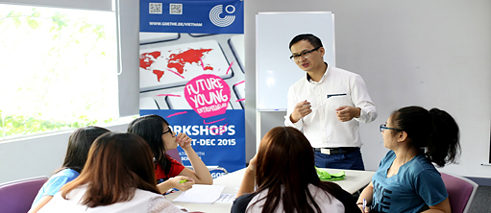Future Young Entrepreneurs 2016
The Future starts today – a startup-project for students

An app that prepares for surviving the jungle, a web portal to find schoolbooks in second hand bookshops, a bike lock that can be closed and opened with a fingerprint: The startup-project „Future Young Entrepreneurs“ trained students aged 15-18 from India, Indonesia, Malawi, the Netherlands, Romania, Vietnam and Germany in the basic skills of entrepreneurship. The preparatory phase included workshops about design thinking, how to draw up business plans, on intercultural business communication and the rhetorical art of the elevator pitch. “The elevator pitch required students to present their start-up idea to a jury in just two minutes as if they were talking during a quick ride on a lift”, explains project manager Irle.
Between November 2015 and March 2016 national pitching competitions took place. The two best teams of each country were chosen to continue their journey to the international finals in Berlin in September 2016. Vietnam sent in the teams Lunat and Jurvival. Both teams came up with an app, one for fashion and one for digital learning about nature. The ten power-girls from the Olympia Schools in Hanoi prevailed their brilliant startup-ideas with success: The team Jurvival made it with their digital learning game to second place worldwide. Their app makes users capable of surviving in the jungle while also conveying lots of facts about the ecology of the Asian country. “We spend up to eight hours a day using smart phones and tablets”, explains pupil Nguyen Thao Nguyen. “Why not use this time wisely?” The third place prize went to a team from Bambino Private Secondary School in Malawi. They want to spread knowledge about their homeland with the Cedar Cultural Center. The first place was awarded to a team from New Delhi whose PeekaBook web portal won over the jury. PeekaBook helps pupils of little means find the schoolbooks they need in second hand bookshops.
The project’s focus was, however, neither on competitiveness nor on the prospects of profits from the pupils’ projects. Instead, it was on multilingualism and associated professional mobility, in other words the future prospects of the participants from around the world and their contemporaries.
In cooperation with

Co-funded by
